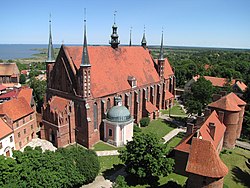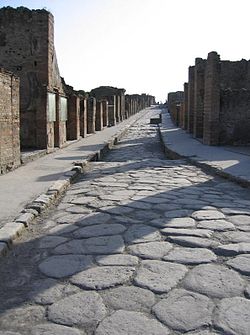View Interesting Maps in a larger map
Frombork [ˈfrɔmbɔrk] (German: About this sound Frauenburg (help·info)) is a town in northern Poland, on the Vistula Lagoon, in Braniewo County, Warmian-Masurian Voivodeship. It had a population of 2,528 as of 2005.
The town was first mentioned in the 13th century. In the early 16th century it was the residence of the astronomer Nicolaus Copernicus who used it as a site for several of his observations. The town and its 700-year-old cathedral were badly damaged in World War II. The German population was expelled and replaced by Poles who had themselves been expelled from former Eastern Poland by the Soviets. After the war the cathedral was meticulously reconstructed and is again a popular tourist destination.
Frombork is known as “The Jewel of Warmia” because of its many historical sites. The Museum of Copernicus in Frombork holds exhibitions related to the astronomer, as well as to astronomy in general, and includes a planetarium. One of the biggest attractions is also the annual International Festival of Organ Music, held every summer. Between 1975 and 1998 the town was part of the Elbląg Voivodeship.
Source:
Wikipedia - Frombork
 Fastnet Rock (from Old Norse: Hvasstann-ait meaning "sharp-tooth ait" — called in Irish: Carraig Aonair, meaning "solitary rock / lone rock") is a small clay-slate island with quartz veins and the most southerly point of Ireland, 6.5 km southwest of Cape Clear Island (Oileán Chléire) in County Cork, which is itself 13 km (8 miles) from the mainland. It lies in the Atlantic Ocean 11.3 km south of mainland County Cork, at latitude 51.37°N. It rises to about 30 m above low water mark.
Fastnet Rock (from Old Norse: Hvasstann-ait meaning "sharp-tooth ait" — called in Irish: Carraig Aonair, meaning "solitary rock / lone rock") is a small clay-slate island with quartz veins and the most southerly point of Ireland, 6.5 km southwest of Cape Clear Island (Oileán Chléire) in County Cork, which is itself 13 km (8 miles) from the mainland. It lies in the Atlantic Ocean 11.3 km south of mainland County Cork, at latitude 51.37°N. It rises to about 30 m above low water mark.


 Frombork [ˈfrɔmbɔrk] (German: About this sound Frauenburg (help·info)) is a town in northern Poland, on the Vistula Lagoon, in Braniewo County, Warmian-Masurian Voivodeship. It had a population of 2,528 as of 2005.
Frombork [ˈfrɔmbɔrk] (German: About this sound Frauenburg (help·info)) is a town in northern Poland, on the Vistula Lagoon, in Braniewo County, Warmian-Masurian Voivodeship. It had a population of 2,528 as of 2005. Samothrace (Greek: Σαμοθράκη, [samoˈθɾaci]) is a Greek island in the northern Aegean Sea. It is a self-governing deme within the Evros Prefecture of Thrace. The island is 17 km (11 mi) long and is 178 km2 (69 sq mi) in size and has a population of 2,723 (2001 census). Its main industries are fishing and tourism. Resources on the island includes granite and basalt. Samothrace is one of the most rugged Greek islands, with Mt. Fengari rising to 1,611 m.
Samothrace (Greek: Σαμοθράκη, [samoˈθɾaci]) is a Greek island in the northern Aegean Sea. It is a self-governing deme within the Evros Prefecture of Thrace. The island is 17 km (11 mi) long and is 178 km2 (69 sq mi) in size and has a population of 2,723 (2001 census). Its main industries are fishing and tourism. Resources on the island includes granite and basalt. Samothrace is one of the most rugged Greek islands, with Mt. Fengari rising to 1,611 m.














